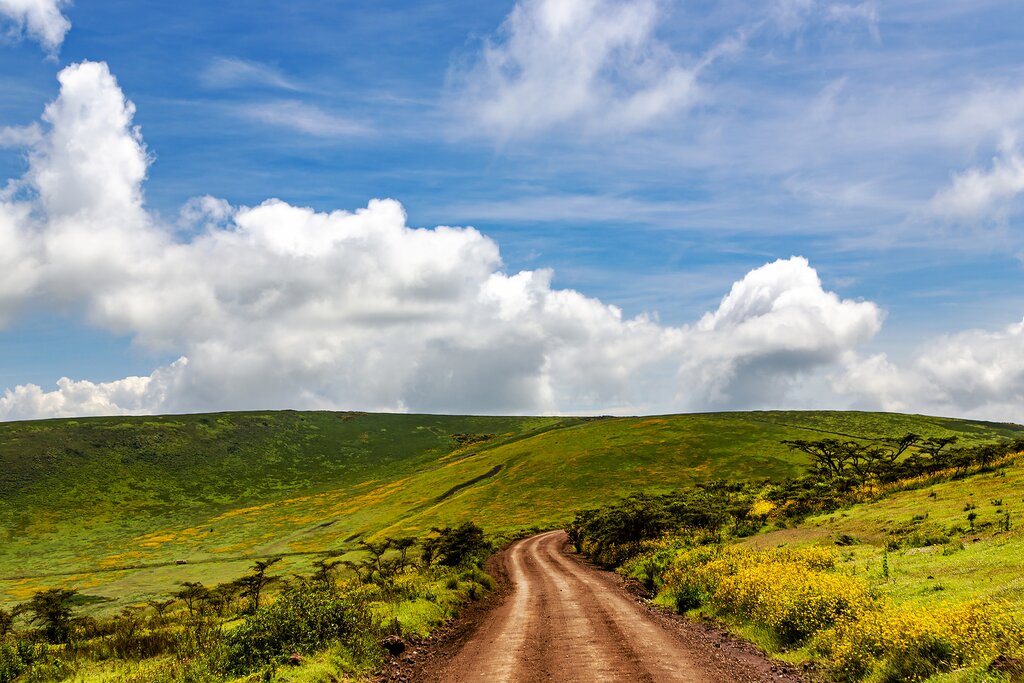Weather
Tanzania has a tropical climate, and temperatures are fairly consistent throughout the year, with the biggest variables being altitude and rainfall. Temperatures are generally between about 77°F–86°F (25°C–30°C) on the lowlands and at the coast, and around 59°F–68°F (15°C–20°C) in the highlands. February is a relatively dry month, sandwiched between the short and long rainy seasons, although there is a chance of experiencing rain everywhere, particularly at night. The period between November and March is often referred to as the "green season."
Crowds & Costs
February is the shoulder season for travel in Tanzania, so expect to see some other visitors on safari and at beach resorts but not the same volume as during the peak season (June to October). You probably won't encounter accommodation or restaurant closures as you would in the off season, and you may find some good deals on safari accommodation and activities, as well as at beach resorts.
Where to Go
If you're traveling to Tanzania to go on safari, head to the northern parks in February, as this is the wildebeest calving season on the Ndutu Plains, Ngorongoro Conservation Area, and the southern part of the Serengeti National Park. Nothing encapsulates that famous circle of life like seeing a baby wildebeest find its legs.
At the other end of the country, the Kitulo National Park in southern Tanzania is beautiful in February. The park in the southern highlands was established in 2005 primarily to protect the area's beautiful orchids, and these—alongside other wildflowers—bloom beautifully between November and April. Visitors can see some of the 45 terrestrial orchids that flourish here in the only botanical reserve in tropical Africa.
Chat with a local specialist who can help organize your trip.
What to Do
If you're considering traveling to Tanzania, you might like to climb Mount Kilimanjaro (19,340 ft/5,895 m), the tallest mountain in Africa. It's a "walk-up" mountain because it doesn't require technical skill to climb, but the high altitude can be challenging. A great alternative to Kilimanjaro is to climb Mount Meru, just southwest and the second-highest mountain in Tanzania at 14,967 feet (4,562 m). Because Meru is significantly shorter, altitude-related problems may be less of a risk. You'll be treated to incredible views across Tanzania, the chance to spot wildlife at lower altitudes, and to hike through varied vegetation and terrain.
Whichever mountain you choose to tackle, mountain climbing in Tanzania is safest and most enjoyable when the weather is dry, and that includes February. Although temperatures will be cold at altitude, February is one of the warmest months of the year, so this is a great time to attempt to summit Kilimanjaro or Meru.
Events in February
Sauti za Busara, Zanzibar. This celebration of African music brings together musicians and singers from across the continent, as well as from Europe and beyond.
Kilimanjaro Marathon, Moshi. Sometimes held in early March, this running event doesn't invite professional runners, so amateurs are guaranteed to win while having a great time.
Traveling to Tanzania in February? Check out these great itineraries
Serengeti & Zanzibar Getaway - 7 Days. Experience Tanzania's most famous highlights in just a week. Start with game drives across the savannas of the Serengeti National Park, followed by a few days relaxing in Zanzibar, an oasis of white-sand beaches and coral atolls.
Hiking Kilimanjaro - 10 Days. Conquer Kilimanjaro, the most formidable mountain in Africa, taking multiple days of ascent before planting your flag atop it.
More Helpful Information
Tanzania in January: Travel Tips, Weather & More
Tanzania in March: Travel Tips, Weather & More
Best Time of Year to Visit Tanzania
How Many Days to Spend in Tanzania
